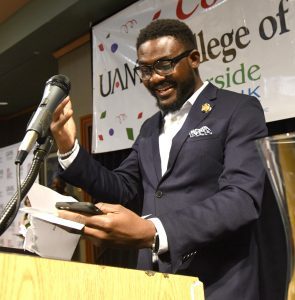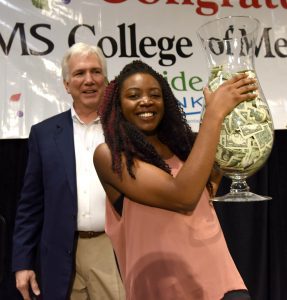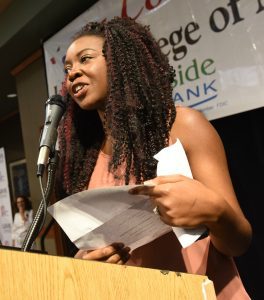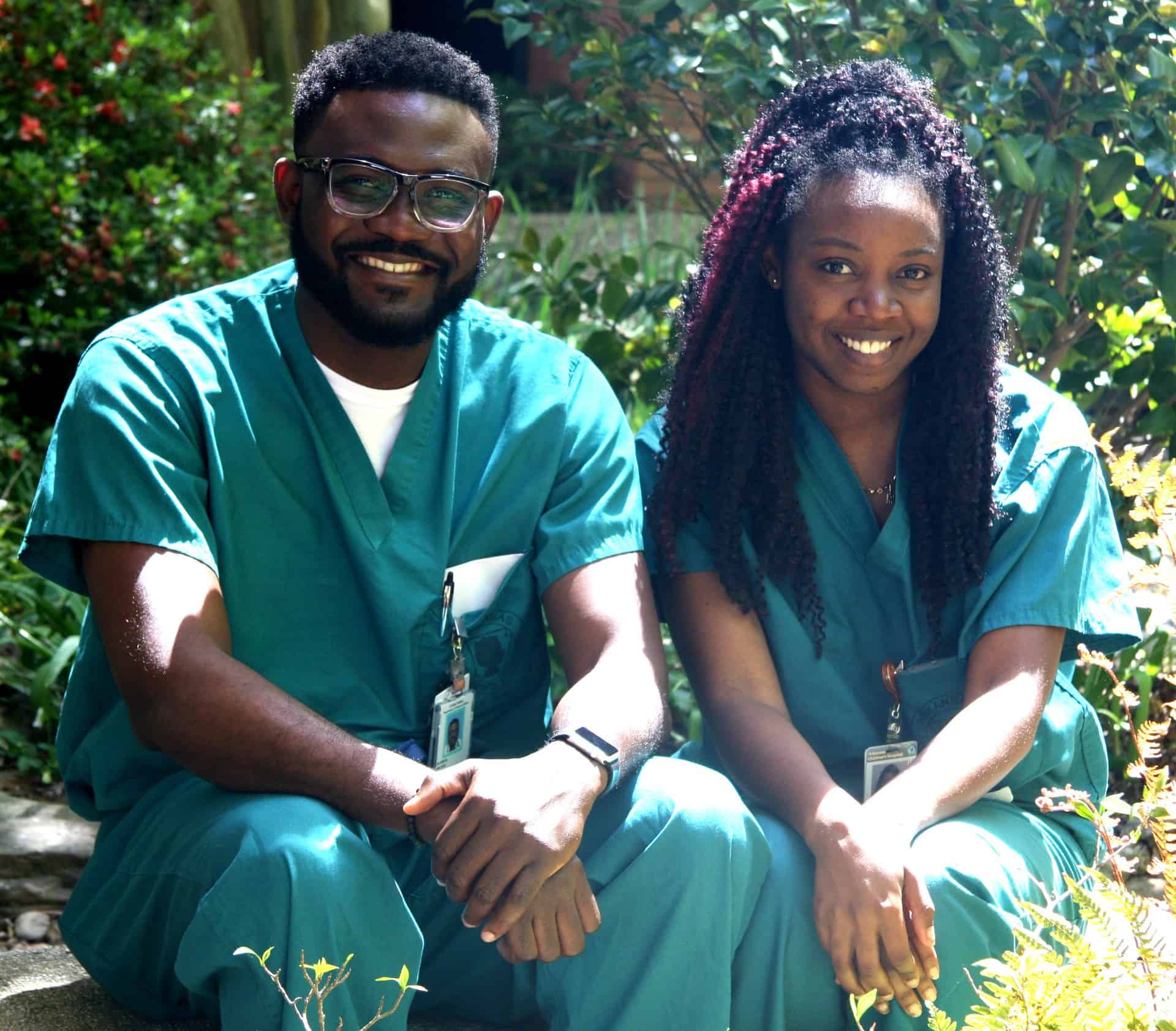Medical School Friends Celebrate People Behind Journey
| May 8, 2017 | Wilson Alobuia could tell just from the smile on Danielle Tchoungang’s face at Match Day that she found good news within the envelope that revealed her residency match.
Alobuia started jumping up and down and yelling, excited for his best friend from medical school and forgetting momentarily that he was recording the life-changing event on his phone. He re-steadied the camera, and Tchoungang confirmed his excitement by announcing from the podium that she would be completing her residency in family medicine at Bon Secours Health System in Midlothian, Virginia, only getting the first few syllables out before she was drowned out with cheers.
Alobuia had learned earlier in the ceremony that he had also achieved his dream match: an opportunity to begin his general surgery residency training at Stanford University in California.

Alobuia reacts on Match Day to finding out that he will be completing his dream residency in surgery at Stanford University.
It was an emotional day, but Tchoungang said she didn’t cry until she bumped into one of her professors and started thanking them for the care they had shown her during her time at UAMS. Both of them said that relationships – with fellow students, with faculty, with staff – are the unsung heroes of medical school.
“My journey has been filled with a lot of God-sent people,” Alobuia said.
‘We’re in the same boat’
Alobuia and Tchoungang are both originally from Africa, but different countries – Ghana and Cameroon, respectively. Still, on Tchoungang’s first day of medical school, she remembers feeling very small in a big room in the I. Dodd Wilson Education Building when she spotted Alobuia among the crowd of new medical students and felt instant relief.
“I immediately knew he was from Ghana,” she said. “Knowing that there was another person with a similar background as mine in class, all I could think was, ‘thank goodness!’”
Tchoungang moved to Minnesota in the middle of high school and later went to the University of Arkansas at Fayetteville. Alobuia moved to Conway after high school and attended the University of Central Arkansas for his undergraduate degree.
Medical school is hard enough in and of itself, but students studying far away from their home countries can face additional difficulties.

Tchoungang holds up the cash she won at Match Day as part of a tradition in which the last student’s name to be called to open their match envelope receives a cash prize. Tchoungang said the money will help with her upcoming wedding.
“Having people you can talk to helps a lot,” Tchoungang said. “He gets my jokes. We can talk about things that other people don’t necessarily understand. He can vent. I can just be real. We communicate in our own way, and in our thick African accent. They’re simple things, but they make a difference.”
“We’re in the same boat,” Alobuia said. “It’s easy for me to complain or vent about something to her because I know she understands my thought process behind it. We studied together for every single test because each time we came across a difficult concept, we could come up with some ‘African way’ of explaining and understanding the material better. Sometimes it was through music, other times just an analogy that goes back to our upbringing as African children.”
Tchoungang said Alobuia helped her come out of her shell – “any social event I went to, it was because of him” – and Alobuia said Tchoungang was the cheerleader he needed.
“She’s good at talking as if things have already happened,” he said. “Like, before Match Day, she knew I was worried about it. So every time she saw me that week, she was like, ‘You’re going to Stanford.’”
Your medical school best friends see you through ups and downs. There’s heartbreak. There’s joy. Tchoungang is engaged and trying to plan a wedding as she wraps up school, which is also why placing with the residency at Bon Secours was so important. Her fiancé is in pharmacy school nearby.
And then there are the scholastic struggles. Standardized tests are not used in their home countries like they are in America, and Alobuia, especially, constantly worried that his test scores would keep him from his dream of becoming a surgeon, but few other people knew what he was going through other than his school mentors and Tchoungang.

Tchoungang reads out her residency match in family medicine at Bon Secours Health System in Midlothian, Va., at Match Day. The location was important because her fiancé is in pharmacy school nearby.
Taking an alternate route
The mentors at UAMS and elsewhere who worked with Alobuia didn’t understand his worries about becoming a surgeon. They would only see his capabilities in the operating room and congratulate him on the bright future ahead. Occasionally, Alobuia would have to admit the problem. A physician from one of his rotations once caught him feeling especially down.
“He walked up to ask what was wrong, and I told him, and his reaction was so matter-of-fact, it stuck with me,” Alobuia said. “He said, ‘really all that means is you’re going to have to take an alternate route to becoming a surgeon. There’s not just one way.”
Alobuia got a recommendation from that mentor and several others. When he did a rotation at Stanford, the people he worked with there couldn’t abide the idea that scores might keep him from returning for a residency, so they provided recommendations as well and helped him practice for his interviews.
In the end, his relationships, work ethic and skill in the operating room more than made up for what he lacked in test scores.
‘Everything I love is there in one place’
Similarly, Tchoungang found helping hands throughout her school experience. Before going to medical school, Tchoungang earned a master’s degree from the UAMS College of Public Health. The help began there – both from other students and from faculty and staff – and continued during her time with the College of Medicine.
“Some of those relationships are incredibly precious to me,” she said.
Collectively, they helped lead her to family medicine. She also has an aunt who is a family medicine doctor in Camden.
“I like so many things, and that’s part of the reason why I chose family medicine,” Tchoungang said. “Every rotation, I was like, ‘wow, I love this.’ I was stressed out about the idea of having to choose between all of them, and then I got to family medicine and found that everything I love is there in one place.”
Looking ahead, the future is like a picture that is slowly coming into focus. Tchoungang might go into rural medicine like her aunt or she might become a hospitalist. Alobuia hopes to be able to make return trips to West Africa to provide voluntary medical services like his adviser and mentor, Jonathan A. Laryea, M.D., who is also from Ghana and is an associate professor of surgery in the Division of General Surgery in the College of Medicine.
“I can’t imagine any of this journey without him,” Alobuia said. “He has literally been my go-to person ever since I moved here.”
Both listed many more as some of the “God-sent people” who were part of their journey, including Billy Thomas, M.D., vice chancellor for diversity and inclusion, and the staff at the UAMS Center for Diversity Affairs.
And it was those people and those backstories that provided the underpinning to the events on Match Day – why Alobuia was so happy on his friend Tchoungang’s behalf, and why when he opened his own envelope, he covered his mouth with disbelief.
The room was already full of friends and family there to celebrate the coming of the next stage of the students’ lives, but if all of the people involved in Alobuia’s and Tchoungang’s – and each student’s – story had been there, no venue could have accommodated them all.
